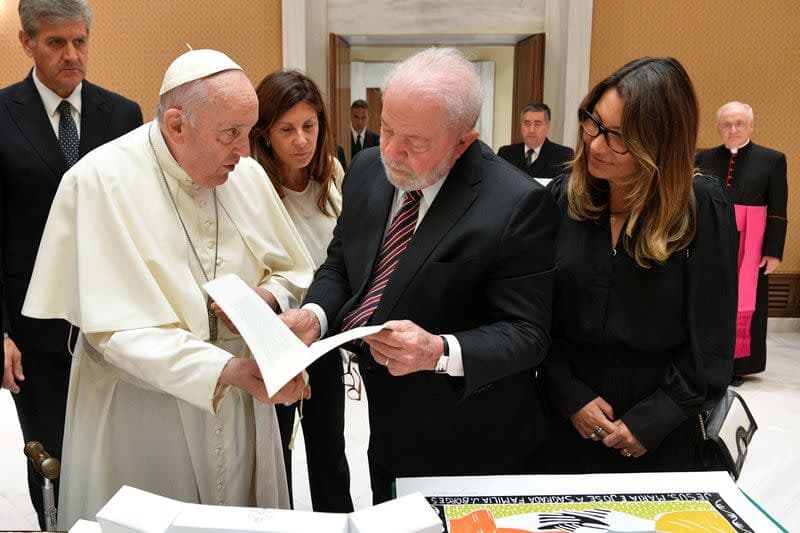SÃO PAULO – When Pope Francis and Brazilian President Luiz Inácio Lula da Silva sat down in the Vatican June 21, it marked the latest tête-à-tête between two Latin American leaders whose stances in international politics have been generating criticism in the West.
Despite the blowback, they apparently agreed to support each other in keeping the same direction.
During a press conference on the following day, Lula told journalists that he talked about the war in Ukraine with the pontiff and said that “he agrees with Pope Francis that there must be people engaged in discussing peace.”
“It is necessary to gather all the actors at a negotiation table, it is necessary to [have a] cease fire, it is necessary to find a peaceful solution, because the world has 800 million human beings that go to sleep every night without eating – and it is not fair to spend billions of dollars in an unnecessary war,” Lula said.
Lula reported that his special advisor for foreign policy, Celso Amorim – who used to be his minister of foreign affairs during previous administrations – has already visited both the Russian leader Vladimir Putin and his Ukrainian counterpart Volodymyr Zelensky.
The encounters, which took place in April and May, were part of Lula’s effort to mediate a potential peace deal between the two nations. Russia is a relevant commercial partner of Brazil, which refused to send military support to the Ukrainians and has been trying to play a neutral role.
“We need to find a common denominator and convince both Putin and Zelensky that the best thing for this war is to end it,” Lula said.
While Brazil has condemned the Russian invasion to Ukraine, Lula has continually avoided to decisively side with the Ukrainians against Putin, a stance similar to the one adopted by the Vatican.
Lula praised the pontiff on several occasions during his interview after the meeting, calling him “the most important political authority on the planet.”
“Regarding the war, the pope has been sending his cardinals to discuss with Zelensky and Putin. We [the Brazilian government] have already talked about it with India, Indonesia and China with the perspective of raising awareness and creating a group of people that can build peace,” Lula said.
Cardinal Matteo Zuppi of Bologna visited Kyiv earlier this month as Francis’s special envoy, and now prepares to go to Moscow. Amorim and Zuppi also met in Rome and discussed the war.
Amorim is taking part in a summit in Denmark with other developing nations that adopted a neutral stance in the conflict, including India and South Africa – which are part of the BRICS bloc along with Brazil, China, and Russia.
Lula reaffirmed during the press conference that a “peace deal is not a surrender of one of the sides,” emphasizing that both Russia and Ukraine must be able to win something that they want.
The other crisis in the international arena connecting Lula and the pontiff is in Nicaragua. During the presidential campaign last year, Lula was continually attacked by former President Jair Bolsonaro for his relations with Daniel Ortega and his failure to condemn the authoritarian acts of the Sandinista leader over the past few years.
Many Catholics in Nicaragua had also criticized Pope Francis for his silence concerning the escalating aggressions of the government to the Nicaraguan Church, which ended up resulting in Catholic radios shut down, members of congregations expelled from the country, and priests and a bishop detained.
Lula said that he “intends to talk to Daniel Ortega about releasing the bishop,” referring to Bishop Rolando Álvarez of Matagalpa, who was detained in August of 2022 by the regime and sentenced to 26 years behind bars for his supposed “subversive acts” against the government.
“There is no reason why a bishop should be impeded from performing his duties in the Church. I will try to help, if I can be of any help,” Lula said.
According to some Brazilian observers, Lula may reap political benefits from being indentified with the pontiff.
“I think Lula’s relationship with Pope Francis has a more symbolic than pragmatic value. The Brazilian left-wing has made a great effort to portray Lula as a politician aligned to the pope, and he has much to win if he deepens such association,” said Francisco Borba Ribeiro Neto, the director of the Pontifical Catholic University of São Paulo’s Center of Faith and Culture.
Concretely, however, Lula and Brazil have not had much to say about the war in Ukraine, Ribeiro Neto noted. The South American nation is not a heavy-weight strategic partner of any side of the conflict and cannot really influence the events in East Europe, especially after Lula assumed an anti-American perspective, he said.
“But when it comes to the Nicaraguan situation, Lula can be much more influential. What we need to know is if Ortega considers that a negotiated solution of his conflict with the Catholic Church is necessary. Maybe he is not looking for any mediator,” he said.
In the opinion of Álvaro Leiva Sánchez, who heads the Central American Association for the Promotion and Defense of Human Rights (known as ACDH-ANPDH in Spanish) from exile in Costa Rica, Lula’s intervention in favor of Álvarez is “positive”, considering that it involves the release of a human being “imprisoned and convicted by a criminal and ignominious regime.”
But Lula’s lack of transparency concerning his relationship with Ortega raises suspicions among human rights activists such as Leiva Sánchez.
“Lula wants us to believe that he ignored the situation of Álvarez and thousands of Nicaraguans that are victims of repression and suffer with statelessness, exile, torture, and unjust deprivation of liberty,” he lamented.
Leiva Sánchez insisted that Lula should intercede not only for the bishop of Matagalpa’s release, but also for his right to remain living and working in Nicaragua.
“The same petition should be made by His Holiness in favor of more than 300 Nicaraguans exiled,” he said.














